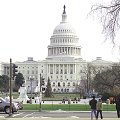- By Elizabeth Shaffer
- News
 Print
Print  Rep. Tom Reed this week joined colleagues on the Ways and Means Subcommittee on Human Resources to begin exploring federal welfare programs and ways to improve efficiency with the purpose of helping move the working poor from poverty to self sufficiency.
Rep. Tom Reed this week joined colleagues on the Ways and Means Subcommittee on Human Resources to begin exploring federal welfare programs and ways to improve efficiency with the purpose of helping move the working poor from poverty to self sufficiency.“There are over eighty federal programs spread across more than a dozen federal agencies dealing with low-income populations,” Rep. Reed said. “Many of them do not provide participants with skills they need to find employment, support a family and gain self sufficiency.”
Some welfare programs, for example, provide assistance for indefinite periods of time, without a review process for individuals to evaluate a basis for ongoing help.
“The fragmented system neglects to address contributing factors to why these individuals seek assistance in the first place and fails to provide incentive for the low-income population to move toward self sufficiency,” Reed continued. “The working poor deserve a fair chance from government rather than an uncaring system which traps them in poverty.”
According to the Congressional Budget Office (CBO), “the federal government devotes roughly one-sixth of its spending to 10 major means-tested programs and tax credits, which provide cash payments or assistance in obtaining health care, food, housing, or education to people with relatively low income or few assets.” Additionally, CBO noted that “total federal spending on those 10 programs (adjusted to exclude the effects of inflation) rose more than tenfold – or by an average of about 6 percent a year – in the four decades since 1972 (when only half of the programs existed).”
“The federal government is spending more taxpayer dollars on these programs and yet, it’s not yielding the results it should,” Reed continued. “Improving welfare system efficiency is fair to both taxpayers and low-income individuals. We can save hardworking, overburdened taxpayers money by better serving the low-income population and getting them back on their own feet.”
This week’s subcommittee hearing was the first in a series devoted to gathering information in order to craft reforms to improve welfare programs.
Rep. Reed also made a recent visit to Chautauqua Opportunities, Inc. in Dunkirk to talk with the organization on ways to support individuals in the transition from poverty to self sufficiency and economic security.
v9i24



